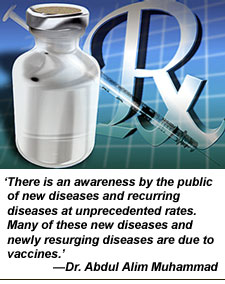Vaccines: A growing concern
By Nisa Islam MuhammadStaff Writer | Last updated: Jan 20, 2004 - 2:20:00 PM
What's your opinion on this article?

|
(FinalCall.com) - When Stacey Morgan took her new baby to the pediatrician she joined a growing group of parents who refuse to have their children vaccinated. "I’ve just heard so many negative things about vaccines that I’m skeptical about their effectiveness," she told The Final Call. "I’ve done research and the very fact that there’s a vaccine injury fund concerns me."
Doctors around the country who treat America’s children are hearing increasing concerns from their patients’ parents about vaccines, and occasionally encountering parents who refuse some or all recommended vaccines for their children, according to a newly published study by University of Michigan (UM) researchers.
"Physicians are in a unique position to both quantify parental concerns about vaccine safety, and provide information on the impact of those concerns on their decision-making as parents," says lead researcher Gary Freed, M.D., M.P.H, the director of the Division of General Pediatrics at the UM Health System and the Percy and Mary Murphy Professor of Pediatrics and Child Health Delivery at the UM Medical School.
Many of the concerns heard by the nearly 750 pediatricians and family practice physicians surveyed for the study were about known, short-term effects from vaccines, such as pain and fever.
But many others were about the allegations that vaccines can cause everything from autism to diabetes, according to results published in the January issue of the American Journal of preventive medicine.
"There is increasing pressure on parents to vaccinate their children. The government is resorting to coercive means to force unwanted vaccines on parents. Even if vaccines were the best thing—which they aren’t—to pressure parents sets up the resistance," said Dr. Abdul Alim Muhammad, Minister of Health and Human Services for the Nation of Islam.
"Parents need to be concerned because thousands of children are disabled or killed in the United States alone from vaccinations. That’s why they developed the vaccination injury fund to compensate parents for the injuries and deaths to their children from vaccines."
According to the Department of Health and Human Services (DHHS) in the early 1980s, reports of harmful side effects following the DTP (diphtheria, tetanus, pertussis) vaccine posed major liability concerns for vaccine companies and healthcare providers, and caused many to question the safety of the DTP vaccine.
Parents began filing many more lawsuits against vaccine companies and healthcare providers. Vaccination rates among children began to fall and many companies that produced vaccines decided to leave the marketplace, creating significant vaccine shortages and a real threat to the nation’s health.
The dilemma was so great that Congress decided to act. A coalition of physicians, public health organizations, leaders of industry, government representatives and private citizens developed the idea of a no-fault alternative to the tort system for resolving vaccine injury claims.
Lawmakers passed the National Childhood Vaccine Injury Act of 1986, which established the National Vaccine Injury Compensation Program (VICP). The program is administered jointly by the Department of HHS, the U.S. Court of Federal Claims (the Court), and the U.S. Department of Justice (DOJ). The VICP is located in the Division of Vaccine Injury Compensation, Health Resources and Services Administration, HHS.
"There is an awareness by the public of new diseases and recurring diseases at unprecedented rates. Many of these new diseases and newly resurging diseases are due to vaccines," said Dr. Muhammad. "An article that just came out in England states that the Gulf War Syndrome was caused by contaminated vaccines that the soldiers received while they were in the Persian Gulf."
Children’s doctors need to be understanding of parents’ concerns, equipped with the latest information on vaccine safety, and ready to react to vaccination concerns or refusals.
The study surveyed a random national sample of pediatricians and family physicians. Of the 743 who responded to the survey, the number of physicians who reported at least one parent had refused a vaccination for a child in the last year was large: 93 percent of pediatricians and 60 percent of family physicians.
Nineteen percent said effects on the immune system were the most common concern that was on the rise, while 16 percent said the concern they heard most often was from parents who wondered how much children really needed all the vaccines recommended by the CDC.
Dr. Freed explained that the upward trend in parents’ vaccine concerns has been suspected for years, as the news media, Internet sites, word-of-mouth and other mechanisms have spread reports of serious health effects from vaccines, including theories about vaccine preservatives and multiple-disease-preventing vaccines.
But the new study quantifies the level to which those concerns are being expressed to physicians and shows how those physicians reacted to the concerns and refusals.
INSIDE STORIES AND REVIEWS
-
-
About Harriett ... and the Negro Hollywood Road Show
By Rabiah Muhammad, Guest Columnist » Full Story -
Skepticism greets Jay-Z, NFL talk of inspiring change
By Bryan 18X Crawford and Richard B. Muhammad The Final Call Newspaper @TheFinalCall » Full Story -
The painful problem of Black girls and suicide
By Charlene Muhammad -National Correspondent- » Full Story -
Exploitation of Innocence - Report: Perceptions, policies hurting Black girls
By Charlene Muhammad -National Correspondent- » Full Story -
Big Ballin: Big ideas fuel a father’s Big Baller Brand and brash business sense
By Bryan Crawford -Contributing Writer- » Full Story






 Click Here Stay Connected!
Click Here Stay Connected!








